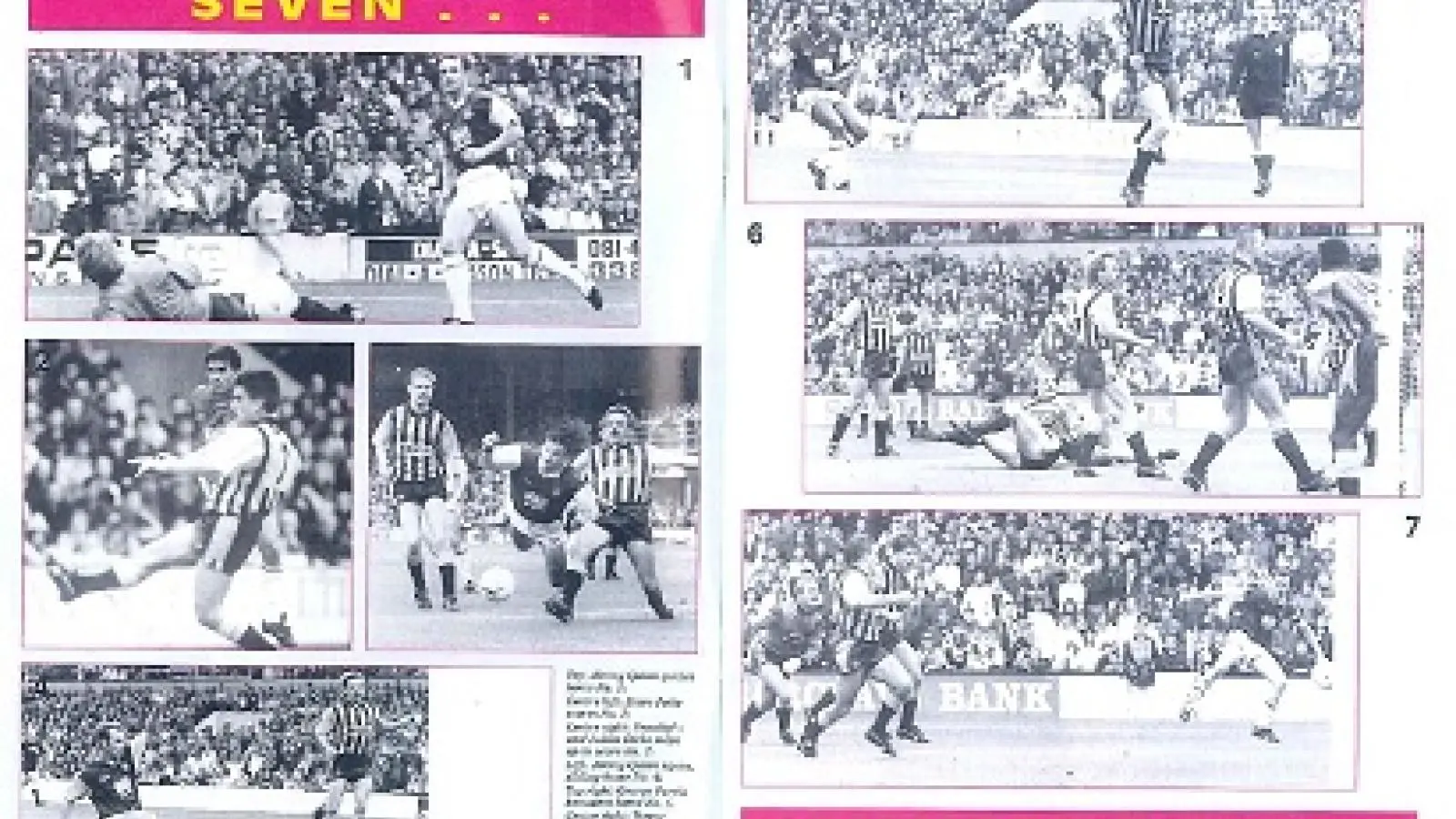West Ham United 7 Hull City 1 Football League Second Division, Boleyn Ground, Saturday 6 October 1990
Rarely has a goal been so warmly welcomed in Boleyn Ground history than Steve Potts’ strike against Hull City here in October 1990.
In 505 first-team appearances for West Ham United, the reliable defender scored just once, in a 7-1 Division Two thrashing of the visiting Tigers.
The goal helped West Ham to one of the biggest victories in the Club’s long history and the largest since an 8-1 home success against Newcastle United during the Boys of ’86 season five years previously.
It also helped Billy Bonds’ side continue their outstanding start to a season that would culminate with promotion back to the First Division after two seasons in the second tier.
West Ham were unbeaten in their opening nine league fixtures and had scored a 3-0 League Cup first-round first-leg win over Stoke City to start the 1990/91 campaign, meaning Bonds and his players should have been full of confidence when struggling Hull arrived in east London.
Instead, Bonds wrote in his programme notes for the game that ‘I detect a little bit of self-doubt in some areas’ and complained that ‘one or two [of my players] go missing when we need them’.
His words were clearly ringing in his players’ ears when they took to the pitch against the Tigers, and it took just eight minutes for Jimmy Quinn to score his second league goal of the season, the striker sweeping home following a fine move involving George Parris and Trevor Morley.
Having gone ahead, however, West Ham allowed their lowly opponents to work their way back into the game. After Potts had been denied by Iain Hesford, Hull equalised through their own right-back David Hockaday, whose hopeful header looped and bounced past Luděk Mikloško on the half-hour mark.
Within a minute, however, the hosts were back in front through Potts’ unique strike. The defender collected a square pass before letting fly from 30 yards. Hesford should have done far better, but allowed the ball to slip through his grasp and into the net.
As well as being a rarity in its own right, Potts’ goal was also one of three scored by West Ham full-backs in the game, as left-back Julian Dicks also blasted in two of his own – the first time West Ham’s No2 and No3 had netted in the same game since John Bond and Noel Cantwell did so against Swansea Town in January 1958.
Into the second half and Morley was brought down on the edge of the box by David Mail, allowing Julian Dicks to smash the penalty straight down the middle.
Just before the hour it was 4-1 as Kevin Keen’s low cross was dummied by Martin Allen and Parris let fly with a shot that was deflected into the top right-hand corner.
By now, the Hammers’ confidence had come flooding back and the Tigers had become lambs to the proverbial slaughter.
Four minutes later, Parris then turned provider, racing down the left wing and providing a curling cross that Quinn expertly volleyed home at the far post for his second of the game.
Ian Bishop’s corner provided the platform for West Ham’s sixth, which Quinn headed down for Morley to control, spin and smash high into the net from close range.
It was left to Dicks to provide the final flurry, making a clever, surging run inside Morley before racing onto a through ball, rounding Hesford and finishing with aplomb from a fairly acute angle.
The vast majority of the 19,472 inside the Boleyn Ground went home happy and sharing in the belief that West Ham were hitting their straps as the season approached the quarter mark.
One might have expected Bonds to echo those euphoric supporters following the Hammers’ emphatic victory, but the manager was never one to get carried away, as his reaction showed.
“Although I was obviously delighted to beat Hull City 7-1, it is important to put things into perspective,” he wrote. “They hadn’t played badly in the first half and did in fact equalise.
“Julian’s penalty – a minute after half-time – came just at the right time, though. After that, they simply caved in. Afterwards, their manager Stan Ternent remarked to me that it was really worth four points to us, because seven goals certainly boosted our goals tally, which could make all the difference come the end of the season.”
As it happened, West Ham did not have to rely on goal difference to take them up in 1990/91 – four teams were promoted and the Hammers finished second, five points clear of third-place Sheffield Wednesday.
As for Hull, Ternent departed Boothferry Park later that season, but his replacement Terry Dolan could not save them from finishing bottom of the pile with 45 points from 46 games, and relegation to Division Three.
Off the pitch, there was exciting news in the Hull programme about the redevelopment of the Boleyn Ground, with a two-page feature entitled ‘Upton Park keeps pace with the 21st century’ detailing the improvements made in the light of the Taylor Report.
There was news of new disabled facilities in the West Stand, new staircases and turnstiles and even the installation of a payphone in the East Stand – how times change!
West Ham United: Mikloško, Potts, Dicks, Foster, Martin, Keen (Rush 76), Bishop, Parris, M. Allen, Morley, Quinn (McAvennie 76)
Goals: Quinn 8, 62, Potts 31, Dicks 46 (pen), 82, Parris 58, Morley 69
Hull City: Hesford, Wilcox, Buckley, Mail, Swan, Hockaday, Palin (Ngata 46), Finnigan (McParland 46), Thomas, Doyle, Payton
Goal: Hockaday 30
Referee: Geoff Hopkins
Attendance: 19,472
